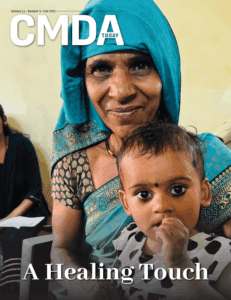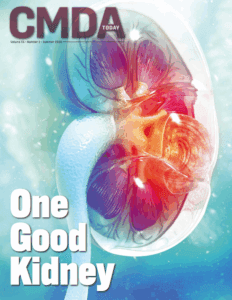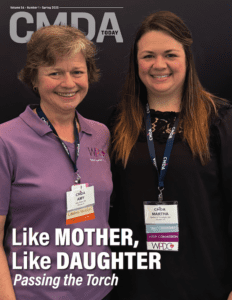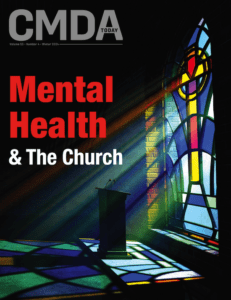Healing from the Violence of Busyness: Five Biblical and Theological Reflections on Time and Work
When a medical code alert went off, my team took the stairs and not the elevators to save us precious seconds in the resuscitation. A “good” intern, I learned, gets their notes done as soon as possible.
by Emmy Yang, MD, MTS
As a medical student, I learned that efficiency was a critical skill in medicine. Each morning, I carefully charted my course through the hospital to pre-round on each of my patients. When a medical code alert went off, my team took the stairs and not the elevators to save us precious seconds in the resuscitation. A “good” intern, I learned, gets their notes done as soon as possible.
This diligent use of time was often necessitated. It meant all 16 patients with appointments could be seen in clinic that day. It meant a trauma patient could be rapidly assessed in the emergency room and taken to the operating room if needed.
However, I started to notice how this mindset of efficiency extended into life outside of medical school. My personal life became a checklist. My days were defined by how many practice questions I reviewed, meals I prepped and emails I sent and answered. I struggled to see where relationships fit in this paradigm of “efficiency.”
Pastor and theologian Simon Carey Holt writes, “Prolonged busyness is a state of violence…to the human soul, the community, and earth.”[i] This violence manifests in medicine in high rates of burnout, moral injury, healthcare worker attrition and poor patient outcomes.[ii],[iii] Against a cultural background of optimization, described by Anne Helen Petersen as the “dominant millennial condition,”[iv] time is lost for therapeutic alliances: between clinicians and patients and clinicians and their communities. Time and human labor become commodities for optimization.
For Christians, these insults invite reflections on what Scripture and theological tradition teach us about time—specifically, our relationship to time and its Creator. As a student of the Theology, Medicine, and Culture fellowship at Duke Divinity School[v] and a physician-in-training, I was consumed by these questions and desired to learn how we heal from the “violence” of busyness.
For those weary and burdened, I offer these five biblical and theological reflections.
- We are first human beings, not human doings.
In Genesis 2:15, God tasks Adam and Eve with cultivating the good gifts of creation. The first humans were responsible for the land. Work is an essential part of our vocation as humans. Work is good.
Yet, the first mention of humans in Genesis is not what humans do, but who humans are. Genesis 1:26 says, “Let us make man in our image, after our likeness…” (ESV). Humanity’s primary identity resides in the imago dei. God defines our very being, breathing life into our bodies (Genesis 2:7). We are first human beings, not human doings.[vi] For Christian healthcare professionals, our works are never definitive of our core identity as beloved image-bearers of God. We hold fast to the truth that God loves us the same, whether or not we are efficient. And inevitably, when we fail to be patient, stay on schedule or make it in time for dinner, we are still holy image-bearers.
- Time is given as a gift for loving God and neighbor.
In order to know how we are to faithfully embody time, first we must know what time is for.
Jesus explains time’s purpose clearly when He said the greatest commandments are to “love the Lord your God with all your heart…soul and…mind” and to “love your neighbor as yourself” (Matthew 22:36-40, ESV). The purpose of time is to love God and neighbor. Theologian and mental health practitioner John Swinton describes time as a “gift from a loving Creator.”[vii]
As a gift, our finite time on earth is an opportunity to share in the life of Christ. Rather than days measured by relative-value units and progress notes completed, Jesus’ life was marked by service toward others. In Mark 5, while on the way to the home of a man with a dying daughter, Jesus stopped in the middle of a great crowd after encountering a woman who had bled continuously for 12 years. He spoke a word of affirmation over her: “Daughter, your faith has made you well; go in peace, and be healed of your disease” (Mark 5:34b, ESV).
At its foundation, the work of healthcare commits to restoring health and attending to the ill and suffering. This is our primary vocation in healthcare and how we are called to spend our time. And yet, so often, loving God and others well—let alone, loving ourselves—is what countless practitioners find difficult to do in modern healthcare.
- The account of man’s fall helps us understand the violent rhythms of human time and identify areas needing change.
Genesis 3 imparts the story of man’s fall and inheritance of original sin by humanity. This narrative contextualizes humanity’s fallen relationship to time. Contrary to the ends of loving God and neighbor, time is utilized as an instrument of profit—hence, the maxim that “time is money.” However, Jesus is clear that we cannot serve God and money (Matthew 6:24).
This relationship is a corruption of the way God designed human life to be. Allied healthcare professionals are treated as commodities of labor.[viii] Resource-intensive patients are shunted away from insurance plans and hospitals. These occurrences are evidence of the structural and systemic sin pervading our healthcare systems.
For Christians in healthcare, this understanding of sin has two consequences. The first is prompting a posture of gentleness and compassion toward ourselves. When healthcare professionals are left hurried and unable to fully attend to their patients, it is not for lack of virtue. Powers and principalities render absence and distance to patient suffering far more tenable than presence.[ix] Such knowledge demands we have compassion when we fall short of our ideals.
The second consequence of our theology of sin helps us identify work schedules and care structures counter to the loving mission of healthcare as spaces for reform. Our faith calls us to actively participate in the weeding out of greed and exploitation. When Jesus encountered tradesmen making the temple courts into a place of commerce, He flipped their tables over, chastising them for turning a profit from a sacred space (Matthew 21:12-13). The sacred work of healthcare must be protected from institutional incentives focused exclusively on efficiency and the bottom line.
- Jesus is present in every moment—in the rush and in the busyness—and is calling us to discern when to slow down.
God does not always call us to slowness; instead, He calls us to discern moments that require our slowing down. The Gospels describe Jesus as someone who lingered to heal the sick and break bread with tax collectors and sinners (Matthew 9:10). Yet, Jesus also moved impassionedly. Luke described Jesus setting out “resolutely” for Jerusalem as His crucifixion drew near (Luke 9:51-52). To love others with our time in healthcare often means using our time efficiently. As bioethicist and internist Lydia Dugdale stated, “Since God is outside of time, I am convinced he can run with me when I am running (how else did I make it through residency training with a faith more robust than when I started?).”[x]
The practice of prayer centers us toward God throughout the busy workday. In prayer, we seek God’s direction in how we are to use our time and who we are called to love at any given moment. In prayer, we find restoration and safety in moments of cognitive overload and emotional exhaustion. This practice cannot be commodified or billed for as a service rendered in patient care. However, it is a practice that aligns us closer and closer to the way God designed us to use our time.
Whether we move at a fast or slow pace, we are equidistant to the saving grace of the cross. The 14th century mystic Julian of Norwich reflects that God is at the “mid-point of everything.”[xi] At the core of our temporal existence is the love and mercy of an omnipresent God.
- We live in storied time with a trajectory toward the redemption of humanity.
Scripture teaches that the arc of humanity is redemption of its fallenness. Death, illness and prior authorizations will be no more. Time will cease to be burdensome.
Furthermore, because God comes into human time in the person of Christ, Christians need not “escape time.”[xii] We know where the story is going. Our lives have been shaped by the dispensation of God’s love. As theologian and ethicist Stanley Hauerwas wrote, we have been given the time we need “reconciled to one another and thus to God.”[xiii]
Christians are invited to live into this redeemed time in the here and now. Every Sunday, we worship in communities that remember this storied time. The rhythm of gathering upsets a linear notion of time co-opted for production. The practitioner sets aside her inbox, as it steadily accumulates new mail, prescription refill requests and lab notifications. At the foot of the cross, she lays her weariness and burdens.
The trainee or practitioner whose shifts extend to Sundays still participates in this storied time. At work, when she remembers that her real work is not documentation but to love her patients…when she remembers to be merciful to herself when she is slow at suturing or quick with a patient…when she uses her positions of power to advocate for more compassionate work schedules and wages, she lives into God’s time.
Learn More
Healthcare professionals pour themselves out for others every day, and CMDA’s Center for Well-being is the place to be refilled! If you find yourself feeling burned out or in distress, then the Center for Well-being is for you. We want to help you align with God, optimize your well-being and maximize your influence. We want to help you find the “sweet spot” of life again, to help you find or regain what the Bible calls “Shalom.” For more information, visit www.cmda.org/wellbeing.
About the Author
Emmy Yang, MD, MTS, is an internal medicine resident physician at the University of North Carolina-Chapel Hill and a graduate of the Theology, Medicine, and Culture Fellowship at Duke Divinity School. While a medical student at the Icahn School of Medicine at Mount Sinai, she participated in the student chapter of CMDA. She hopes to care for her colleagues as she cares for her patients.
[i] Simon Carey Holt, “Slow Time in a Fast World: A Spirituality of Rest,” Ministry, Society and Theology 16, no. 2 (2002), https://simoncareyholt.wordpress.com/writing/.
[ii] C. P. West, L. N. Dyrbye, and T. D. Shanafelt, “Physician burnout: contributors, consequences and solutions,” J Intern Med 283, no. 6 (Jun 2018), https://doi.org/10.1111/joim.12752, https://www.ncbi.nlm.nih.gov/pubmed/29505159; E. S. Williams, C. Rathert, and S. C. Buttigieg, “The Personal and Professional Consequences of Physician Burnout: A Systematic Review of the Literature,” Review, Medical Care Research and Review 77, no. 5 (Oct 2020), https://doi.org/10.1177/1077558719856787. W. Dean, S. G. Talbot, and A. Caplan, “Clarifying the Language of Clinician Distress,” Jama 323, no. 10 (Mar 10 2020), https://doi.org/10.1001/jama.2019.21576.
[iii] T. D. Shanafelt et al., “Burnout and medical errors among American surgeons,” Ann Surg 251, no. 6 (Jun 2010), https://doi.org/10.1097/SLA.0b013e3181bfdab3, https://www.ncbi.nlm.nih.gov/pubmed/19934755.
[iv] Anne Helen Petersen, “How Millenials Became the Burnout Generation,” BuzzFeed News, January 5, 2019 2019, https://www.buzzfeednews.com/article/annehelenpetersen/millennials-burnout-generation-debt-work?utm_source=dynamic&utm_campaign=bfsharecopy.
[v] https://tmc.divinity.duke.edu/
[vi] Dr. David Kim, physician and CEO of Beacon Community Health Center in Staten Island, NY and CMDA member, wrote in an email to New York chapters of CMDA that we are first “human being[s],” and not “human doing[s].”
I am grateful to Dr. Kim for this reminder and hope to keep this nugget of wisdom with me throughout my training.
[vii] John Swinton, Becoming Friends of Time : Disability, Timefullness, and Gentle Discipleship (Waco, TX: Baylor University Press, 2016), 58.
[viii] Danielle Ofri, “The Business of Health Care Depends on Exploiting Doctors and Nurses,” Opinion, New York Times (New York, NY), June 8, 2019 2019, https://www.nytimes.com/2019/06/08/opinion/sunday/hospitals-doctors-nurses-burnout.html?fbclid=IwAR3lXG06HlIgsVUoyVJCQ1FllF424Rf1cD3ffDWEOch2otid5rDxTjOtyYs.
[ix] B. W. Frush, “Suffering Absence: Hauerwas and the Challenges to Faithful Presence in Contemporary Medical Training,” Linacre Q 87, no. 4 (Nov 2020), https://doi.org/10.1177/0024363920937626, https://www.ncbi.nlm.nih.gov/pubmed/33100394.
[x] Swinton, Becoming Friends of Time : Disability, Timefullness, and Gentle Discipleship, 81.
[xi] Julian and B. A. Windeatt, Revelations of Divine Love, Oxford World’s Classics, (Oxford: Oxford University Press, 2015), 56.
[xii] Stanley Hauerwas, The Work of Theology (Grand Rapids, MI: Eerdmans, 2015), 95.
[xiii] Hauerwas, The Work of Theology, 102.
[1] Simon Carey Holt, “Slow Time in a Fast World: A Spirituality of Rest,” Ministry, Society and Theology 16, no. 2 (2002), https://simoncareyholt.wordpress.com/writing/.
[1] C. P. West, L. N. Dyrbye, and T. D. Shanafelt, “Physician burnout: contributors, consequences and solutions,” J Intern Med 283, no. 6 (Jun 2018), https://doi.org/10.1111/joim.12752, https://www.ncbi.nlm.nih.gov/pubmed/29505159; E. S. Williams, C. Rathert, and S. C. Buttigieg, “The Personal and Professional Consequences of Physician Burnout: A Systematic Review of the Literature,” Review, Medical Care Research and Review 77, no. 5 (Oct 2020), https://doi.org/10.1177/1077558719856787. W. Dean, S. G. Talbot, and A. Caplan, “Clarifying the Language of Clinician Distress,” Jama 323, no. 10 (Mar 10 2020), https://doi.org/10.1001/jama.2019.21576.
[1] T. D. Shanafelt et al., “Burnout and medical errors among American surgeons,” Ann Surg 251, no. 6 (Jun 2010), https://doi.org/10.1097/SLA.0b013e3181bfdab3, https://www.ncbi.nlm.nih.gov/pubmed/19934755.
[1] Anne Helen Petersen, “How Millenials Became the Burnout Generation,” BuzzFeed News, January 5, 2019 2019, https://www.buzzfeednews.com/article/annehelenpetersen/millennials-burnout-generation-debt-work?utm_source=dynamic&utm_campaign=bfsharecopy.
[1] https://tmc.divinity.duke.edu/
[1] Dr. David Kim, physician and CEO of Beacon Community Health Center in Staten Island, NY and CMDA member, wrote in an email to New York chapters of CMDA that we are first “human being[s],” and not “human doing[s].”
I am grateful to Dr. Kim for this reminder and hope to keep this nugget of wisdom with me throughout my training.
[1] John Swinton, Becoming Friends of Time : Disability, Timefullness, and Gentle Discipleship (Waco, TX: Baylor University Press, 2016), 58.
[1] Danielle Ofri, “The Business of Health Care Depends on Exploiting Doctors and Nurses,” Opinion, New York Times (New York, NY), June 8, 2019 2019, https://www.nytimes.com/2019/06/08/opinion/sunday/hospitals-doctors-nurses-burnout.html?fbclid=IwAR3lXG06HlIgsVUoyVJCQ1FllF424Rf1cD3ffDWEOch2otid5rDxTjOtyYs.
[1] B. W. Frush, “Suffering Absence: Hauerwas and the Challenges to Faithful Presence in Contemporary Medical Training,” Linacre Q 87, no. 4 (Nov 2020), https://doi.org/10.1177/0024363920937626, https://www.ncbi.nlm.nih.gov/pubmed/33100394.
[1] Swinton, Becoming Friends of Time : Disability, Timefullness, and Gentle Discipleship, 81.
[1] Julian and B. A. Windeatt, Revelations of Divine Love, Oxford World’s Classics, (Oxford: Oxford University Press, 2015), 56.
[1] Stanley Hauerwas, The Work of Theology (Grand Rapids, MI: Eerdmans, 2015), 95.
[1] Hauerwas, The Work of Theology, 102.




